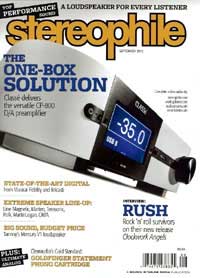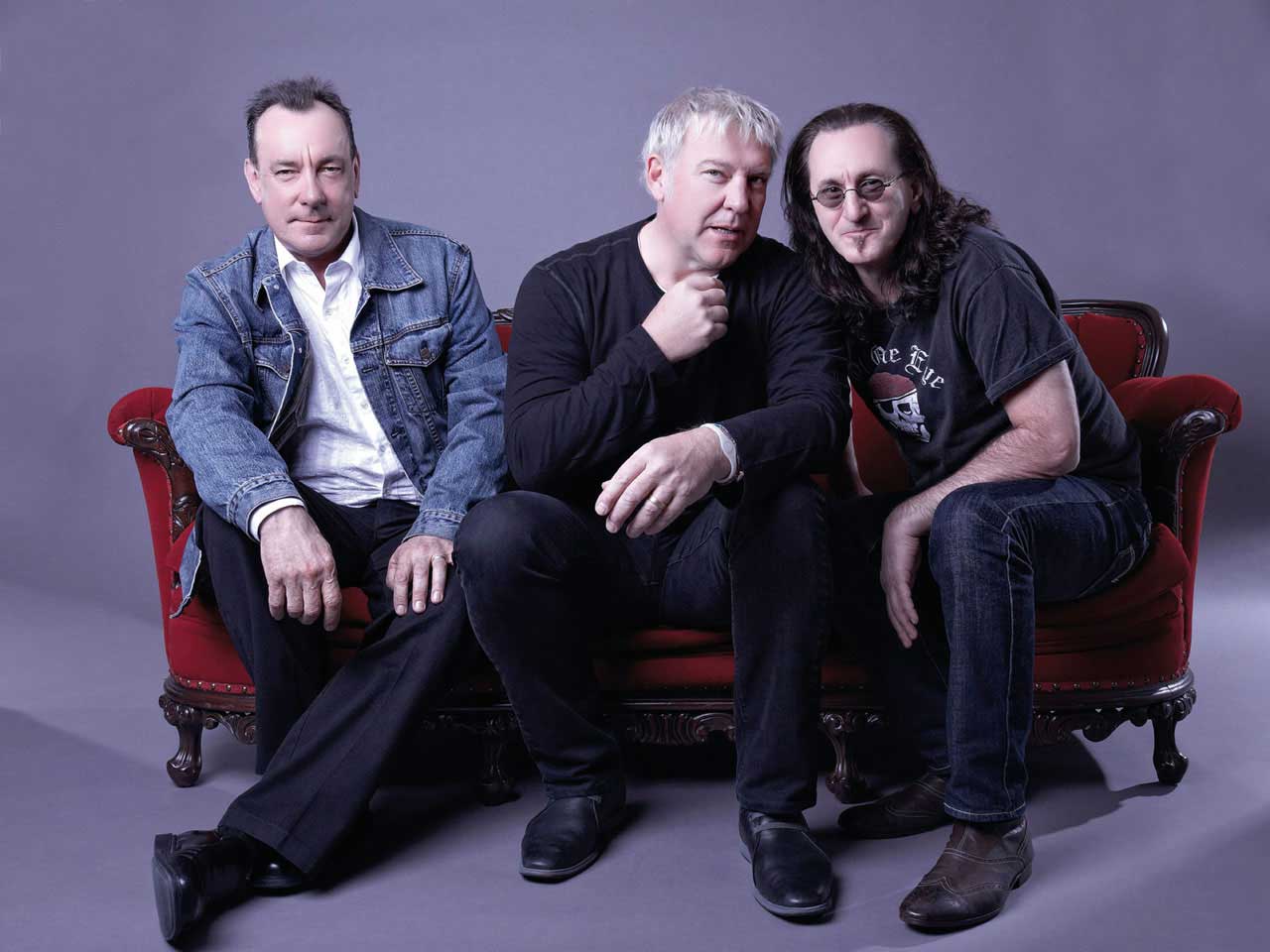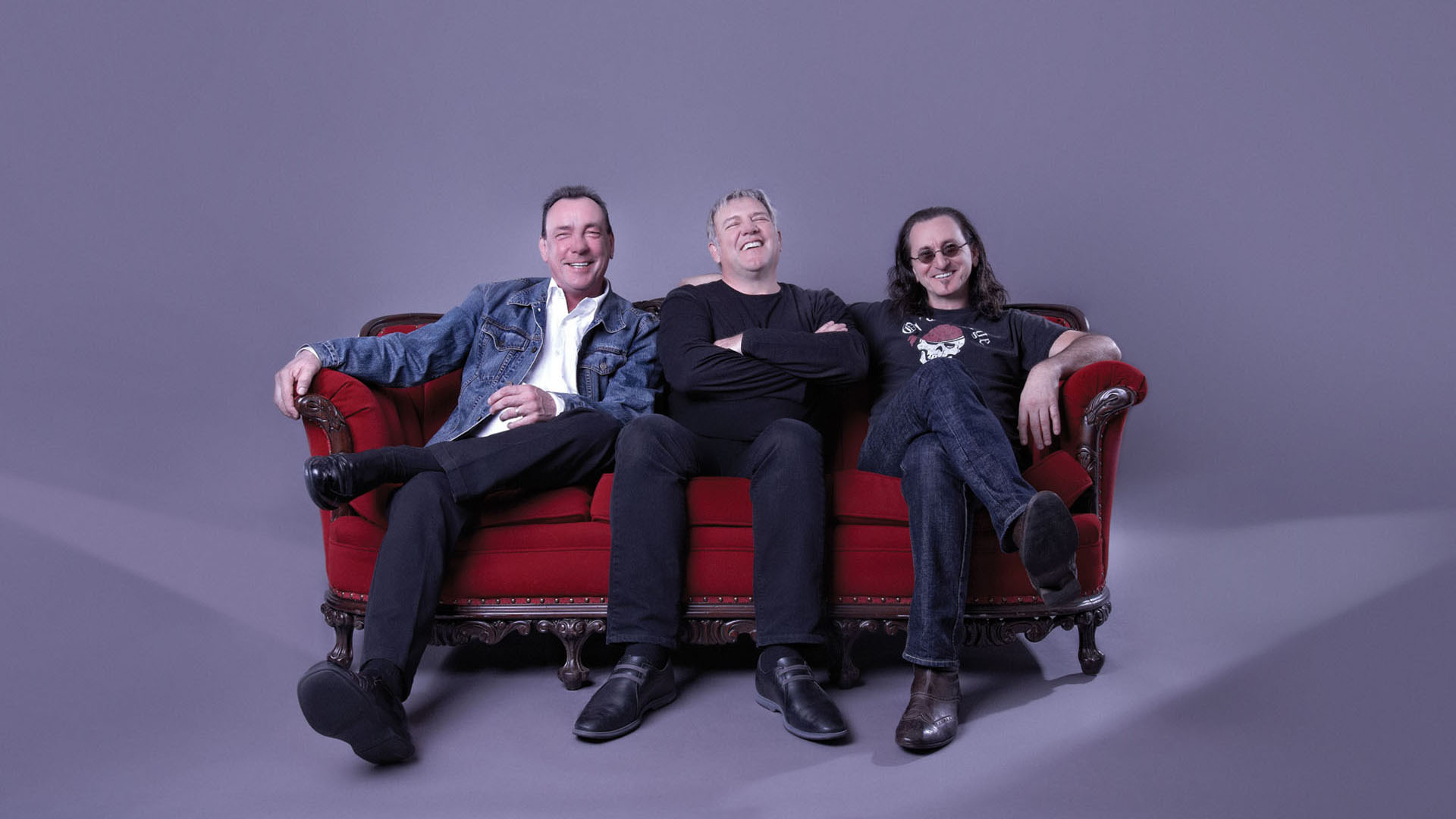Working Men
Rush Celebrate More Than Four Decades of By-Tor, Geddy Lee's Voice, and the World's Biggest Drum Kit
By Robert Baird, Stereophile, September 2012, transcribed by John Patuto

"We tried to do some work between the legs of... Ummmm... that sounds weird."
Rock musicians - do they ever think about anything but sex?
Rush guitarist Alex Lifeson chuckles. He explains that what he meant to say was that he, singer-bassist Geddy Lee, and the exalted, formerly mustachioed object of Planet Earth's most fervent drummer cult, Neil Peart, were trying to write songs during a break in a recent tour.
Easily one of the music world's most polarizing acts, the objects of equal amounts of swooning and derision, Rush has become a rock institution. Those who love and hate the band inevitably cite the same factors: Lee's unforgettably high voice, Peart's grandiose fantasy/sci-fi Dungeons & Dragons lyrics, and the long, multi-part rock suites that appear on many of their studio records. Depending on the listener, all three can be either nauseating or awesome, dude! Other points of contention are Rush's constantly changing time signatures, their heady mix of metal, prog rock, and power-trio bombast, their instrumental virtuosity - and, of course, Peart's drumming on what, for many years, has been rock's most insanely tricked out 360 degree kit. Think multitudes of mount toms, glockenspiels, and dragon gongs, and you're there. The Peart cult is so fanatical that it's been enshrined in pop culture, thanks to Seth MacFarlane and a classic aside in his animated series Family Guy, starring Chester Cheetah, that's easily available on Youtube.com. The band also appeared onscreen, as their cartoonized selves, in an episode of South Park.
Whatever the merits of their music, lyrics like "Oh, I will dine on honeydew / And drink the milk of Paradise," (which is a near quote from Samuel Taylor Coleridge's poem "Kubla Khan") and costumes that once included elaborate, belted, Asian-style tunics that Lee, in a recent Mojo interview, called "absurdly prophetic robes," Rush has, by virtue of longevity, become one of the most productive acts in the increasingly long-in-the-tooth world of classic rock. They've sold over 40 million albums worldwide - and, in a statistic you may have to read twice to grok, according to the Recording Industry Association of America (RIAA), this trio of determined Canadians has earned the third-highest number of consecutive gold/platinum studio albums (24) released in the US by a rock band, trailing only the Rolling Stones and the Beatles. Their website sells 32 different men's T-shirt designs, six different patterns of Rush socks, and, yes, copies of Peart's copper-mercury-amalgamation, colored, autographed Pro Mark drumsticks, as currently featured on www.neilpeartdrumsticks.com - one of myriad websites devoted to the band's every move. Rush's new album, Clockwork Angels, is their 31st.
After the 14-month world tour supporting their last studio album, Snakes & Arrows (2007), Rush decided to take a year off to write Clockwork Angels, only their third studio album since 2000. But in that time they've made five live albums, and an eight-song EP of classic-rock covers [sic - timing is a little off there]. As so often happens, commerce - in this case, a tour based on the idea of time travel - superseded art, and after a break the band went back on the road, in the process recording Time Machine 2011: Live in Cleveland, their ninth live set. In the pantheon of live Rush records, Time Machine ranks in the middle of the pack, musically ahead of Exit... Stage Left (1981) and the synth-marred A Show of Hands (1989) and behind their two best, Different Stages: Live (1998), with its glorious "lost" show from 1978, and the band's first foray into concert recording, All the World's A Stage (1976), which, though not well recorded, still sounds convincingly raw and real. Prior to the start of the Time Machine tour; Rush recorded five songs in Nashville; two of these, "Caravan" and "BU2B," ended up on the Time Machine set list and became the anchor tracks of Clockwork Angels.
Last year, after the Time Machine tour ended, Rush returned home to Toronto and began to review the music they'd worked on between the legs, as it were. 'We went back to what we'd done in that short break, and in those sessions resided 'Headlong Flight,' and that was really the catalyst for getting us all fired up for writing the rest of the album," says Lifeson (born Alexander Zivojinovich). "'Clockwork Angels' was something that I had written. It was just a bit of noodling - I had a little bit of fun at home during the break. I brought it to the guys, and everyone thought there was something really there. Geddy [born Gary Lee Weinrib] tends to really get into the arranging of the material, and he said, 'I really think you have something great here. Do you mind if I cut it up and mess around with it?' And I said, 'Sure.' I came back the next day, and he had a great blueprint for the way the song was going to be."

Clockwork Angels, a return to a leaner, less cluttered rock sound, is available on CD and LP, and as a 24-bit/96kHz high-resolution download from Chesky Records' HDtracks.com. Geddy Lee's bass is more prominent in the mix than it's been in some time, while Lifeson shows off his monster chops throughout. After years of wear and tear, Lee's voice is lower, with an agreeably rough edge.
Love 'em or hate 'em, Rush remain, without question, a muscular trio of instrumental thoroughbreds. While Peart's lyrics seem more focused and personal than usual - more love and hate, less Xanadu - this is still a concept album, about the mythic journey of a young protagonist who travels through a bewildering world of lost cities and phantasmic landscapes, at every turn battling the evil presence of the autocratic ruler, The Watchmaker. While such phrases as "Cathedral of the Timekeepers" and "alchemist priests" appear in the between-songs story printed in the album booklet, the concept of Clockwork Angels is less intrusive than in past Rush epics. Peart, once a fan of Ayn Rand who, in the Mojo interview, now calls himself a "bleeding-heart libertarian," novelized the album's story with help from sci-fi author Kevin J. Anderson. While prog rock and metal are the dominant flavors here, Lifeson in particular has moments where he turns jazzy, bluesy, or speed-metal-esque. Peart, throughout and as always, is the master technician and timekeeper.
Lifeson immediately rejects the comparisons that have been made between Clockwork Angels and the sprawling 2112, whose 20-minute title track, in seven sections, became an unlikely hit when released in 1976, and saved the band's then-teetering career. "No, I don't see that at all," he says. "I think what we managed to nail on this record are some very strong choruses. I think they stand out. The most important thing is that we've stripped it down. It's not as dense as Snakes & Arrows, and I think maybe this is where the comparison comes in. This is more of an older Rush approach. The guitars are just doubled, not quadrupled. We don't have acoustics playing under electrics, or a rhythm-guitar track under a solo. We really made a concerted effort to avoid all of that stuff, so consequently there's a freshness to the record. The drums are live, the bass is live, the guitar is live, you can hear everything, there's great articulation of the instruments and the spaces in between. And Geddy's vocals are great."
While the music on every Rush album is the work of Lee and Lifeson, who've been friends since junior high in Willowdale, Ontario, where they grew up just outside Toronto, the lyrics have been Peart's domain since he joined the band in 1974, in time for their second album, Fly by Night (1975). Peart's words on Clockwork Angels continue to show the effects of the tragedies that shook his life in 1997, and nearly finished the band: His daughter, Selena, was killed in a single-car accident, and 10 months later his wife, Jacqueline, died of cancer. Peart has said in interviews that he feels she really died of a broken heart. At Jacqueline's funeral, Peart informed the other two members that he was retiring from music.
The joy and pain that we receive
Each comes with its own cost
The price of what we're winning
Is the same as what we've lost.
-from "BU2B," on Clockwork Angels
All I know is sometimes you have to be wary
Of a miracle too good to be true
All I know is that sometimes the truth is contrary
Everything in life you thought you knew
All I know is that sometimes you have to be wary
'Cause sometimes the target is you.
-from "The Wreckers," on Clockwork Angels

"This is a story," Lifeson says of Clockwork Angels. "This is not an autobiographical story. Certainly I think Neil is drawing from some experience - but mostly from observation. I think he really nailed it this time. It's not an easy task to work with his lyrics. They can be a little wordy. There are a lot of times where Geddy finds one line that he connects with, and he says, 'I really love the sentiment here, and I think that's the key thing. Can we rewrite everything in this particular song around that?' To his credit, Neil's always up for it. He never complains, and I know it's got to be difficult - he spends a lot of time on his lyrics. But Geddy has this ability and it's from decades of working together - to really get to the core of what the essence is."
The press materials for Clockwork Angels contain an ominous paragraph about the quality of the project's sound: "Clockwork Angels has been mastered specifically for [sic] iTunes format in mind, ensuring the delivery of the music to listeners with increased audio fidelity, more closely replicating what the artists, recording engineers, and producers intended."
When asked about this and his band's stance on the ongoing loudness wars in recorded sound - ie, dynamic range vs maximum volume, much of the latter spurred by the popularity of the Apple iPod - Lifeson is quick to give his side. "Over anything else, dynamics are the most important thing to us. And it is a bit of a struggle, it is a war. Vapor Trails [2002], for example, was mastered so hot, it really wrecked the album. I can't listen to that record. It's so flat and has so much distortion that we really want to remix that record. It was out of our hands when it was mastered, and the mastering engineer did a poor job. He's the first one to admit it. He really pushed it.
"I think with [Clockwork Angels], when we were in the mastering phase, we really went back and forth a lot," Lifeson continues. 'We did test masters. We mixed a couple songs at a time, mastered a couple songs at a time. Unfortunately, in this day and age, you've got to try and find some middle ground. The problem is, the way people listen to music now, they don't listen to one kind of music all the time. It's on your iPod or your iPhone or whatever, and you've got hundreds if not thousands of songs, and I guess you need some kind of level that's standard to everything, and I think that's why there's this kind of push to go louder - but it kills dynamics, and really sucks those moments out of the mix."
While the sonics of Rush albums including Clockwork Angels vary from muddled and squashed to extremely good for rock records meant to jump out of a radio (and so compressed to varying degrees), those records have undergone several remasterings in recent years, most recently and most controversially for the three Sector boxed sets released in 2011. Those contain, in chronological order, the 15 albums Rush recorded for Mercury (now owned by Universal), all remastered, according to marketing info, in hi-rez 24/96 audio. Each set also contains one album on DVD-Audio, remixed in 24/96 stereo and 5.1-channel surround sound. Besides glitches that appeared in several discs (which were replaced free of charge by the band), other than the DVD title, the remaining albums in each set were downsampled to 16-bit/44kHz.
After Peart's personal tragedy, the most life-changing event in Rush's 44 years has to be, strangely enough, not a record but the 2010 documentary film Rush: Beyond the Lighted Stage, which won the 2010 Audience Award at the Tribeca Film Festival, in New York City. Even hardened critics were charmed. Andrew Pulver of the UK's The Guardian wrote, on June 4, 2010: "A wonderfully engaging and genuinely interesting career profile of Rush, those most derided of prog-rock shriekers, tracing their path from anonymous Toronto suburbia to self-effacing power-trio legends."
"To do a film, a documentary. I don't know, we felt a little embarrassed by the prospect of it," Lifeson says. "When they approached us, we didn't really think there was anything of interest. They assured us that there was a story that needed to be told and people would respond to it. I think [directors] Scot [McFadyen] and Sam [Dunn] did a really good job.
"It certainly broadened our audience. People that had heard the name but knew nothing about us suddenly became interested - they really liked the film, and wanted to get some records. One of the most interesting segments of that audience are women. It's always been a bit of joke that there've never been female Rush fans, but truly there have always been some. But now I see girls coming to our shows - two, three, four, five of them together, not with their husbands or boyfriends but on their own. And they're air drumming and singing along. I think perhaps an aspect of that film has brought them in. They look at us and they see family guys, married, been with their wives forever, have kids - family is very, very important, and they relate to that. It's very interesting to see that.
"The film has also certainly made our lives a lot less private. We were quite happy chugging along where we were, just under the surface, and we still had our anonymity. I'm not saying we can't go out on the street or anything, but it's really quite different the last few years."
What's perhaps most compelling about the new record, Clockwork Angels, is the continued high energy the three pour into their music. That, and the sense that this is a band that still enjoys being together after more than 40 years.
"That does seem to be the case," Lifeson says. "I can't really speak for a lot of other bands and what their relationships are truly like, but in most cases there's always some kind of tension or conflict. Over the years, we've certainly had our moments when we didn't get along that well, but they were always rooted in some personal trauma or pressure. And I have to say, from my point of view, whenever that's happened, you've always had the support of the other guys. You may not have wanted to be with them - you didn't want to be with anybody - but there was always respect for that space. We've gone through some really difficult crises in our career as a band and as friends, and we've survived that. It's not lost on us that we came through that really difficult period with Neil in the '90s.
"I really love those guys. Geddy's my best friend. Always has been. I see him all the time. We don't just work together, we play together. And it's great to me, on the cusp of 60 years of age, that my longest, closest buddy, I get to play in Rush with him."
Speaking of playing in Rush, how much these days do these three late fifty-somethings, who no longer have to worry about financial security, think about bagging the huge worldwide tours, kicking back, and enjoying their secure celebrityhood?
"[Clockwork Angels] is obviously becoming an important record for us, and so, of course, we want to do it justice - but it is becoming more difficult. Neil spends a lot of time in training before a tour. He needs to build his stamina. By the end of a tour, I see it - he's just wasted. We all are. The last tour, we all felt it. For the first time, I think we all felt really exhausted early in the tour.
"We're trying to pace it a little better. We're not doing consecutive dates anymore; it's now gonna be day on, day off. That's gonna make a big difference, especially for Geddy recovering with his voice. But there's definitely a physical toll that's taken. It's just physics - you reach a certain age and you just don't have that same energy level. And you don't recover. That's really what it is - you just don't recover from expending a lot of energy.
"I think we'll do it as long as we physically can. We don't want to be..."
A studio band?
"No, not really. That's great and everything, but it's awesome to stand onstage and play. I think, in the future, we might do tours that are shorter and spaced farther between. Eventually we're gonna hang it up, but I think we're playing too well right now to allow ourselves to cash it in."